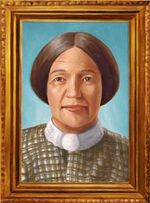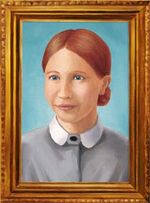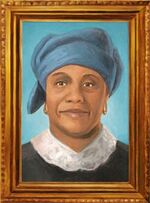Abena[]
An orphaned girl who lives in the Louisiana swamps with her brother, Caimon.
Jacques Paul André[]
A French artist traveling aboard The Liberty in The Hidden Gold. He travels from Paris to paint pictures in the United States.
Annie[]
The Gardners' former maid. She quits her job after having an argument with Mrs. Curtis, as mentioned in Marie-Grace and the Orphans.
Monsieur Antoine[]
A carriage driver for Cécile and her family.
Sister Beatrice[]
An elderly nun who runs the Holy Trinity Orphanage. Marie-Grace describes her as kind. Sister Beatrice invites Marie-Grace to come play with the children whenever she wants. Sister Beatrice is a friend of Aurélia and Octavia Rey, as she helped them after their parents died.
Sylvia Bell[]
The prima donna of Foxcroft's London Opera Company,
Monsieur Bernard[]
The driver of a hired carriage who takes Luc Rousseau and Marie-Grace to Canal Street in Meet Marie-Grace.
Jack Bold[]
A man seen traveling aboard The Liberty in The Hidden Gold. He works by selling jewelry up and down the Mississippi River.
Bridget[]
A seamstress in The Haunted Opera making costumes for the chorus members of Foxcroft's London Opera Company.
Monette Bruiller[]
A free girl of color who is close friends with Cécile Rey. She has black hair. Cécile and Monette do not have any sisters, which is part of the reason they have bonded, though Monette has multiple brothers.
Cécile sees her at her Mardi Gras ball; Monette wears a pink princess dress. When Aurélia suggests a similar pink dress for Cécile, she vetoes it as she does not want to dress like any other girl at the ball.
After Armand gets sick with yellow fever, Monette stops by the house with her father and gives Cécile a jar of preserves as a gift. In Cécile's Gift, the girls reconnect after the yellow fever epidemic is dying down.
Richard Bruiller[]
The father of Monette Bruiller. He is described as tall and husky and runs a tailor shop. Richard and Monette stop by the Rey household to bring meats and vegetables from Richard's brother's farm as all of the markets are closed by August 1853. He plans to bring the rest of the food to nearby orphanages and hospitals.
Caimon[]
An orphaned boy who lives in the Louisiana swamps with his sister, Abena.
Sister Catherine[]
A nun seen traveling aboard The Liberty in The Hidden Gold. Sister Catherine is described as tiny and talkative.
Marie Conant[]
A peer of Cécile and the Metoyer sisters. In Meet Cécile, Agnès says she and Fanny are going to a wonderful tea at her house after dropping their packages off.
Charlie[]
A young orphan at Holy Trinity Orphanage who enjoys playing with Marie-Grace.
Mrs. Curtis[]

Mrs. Curtis.
A widow who works as the Gardners' housekeeper. She eventually flees New Orleans due to the outbreak of yellow fever.
Mrs. Curtis is friendly but strict. She is also superstitious. When yellow fever breaks out in the city, she encourages Marie-Grace to wear a head of garlic on a string to ward away the fever.
Anna Day[]
A free woman of color and dressmaker. She fits Mardi Grass silk ball gowns for Aurélia Rey and Octavia Tay. Cécile is eager to share the details of Anna's stitching and fitting with Marie-Grace at her voice lesson.
Roberto DiCarlo[]
A member of Foxcroft's London Opera Company. Though his real name is 'Robert Carlo', he is known as 'Roberto DiCarlo' due to the popularity of Italian opera stars.
Monsieur Dupont[]
The owner of a pharmacy around the corner from Jackson Square. Dr. Gardner often picks up medications from Monsieur Dupont. Marie-Grace says she often likes to look around the shop while her father is talking.
Perrine Dupree[]
An orphan and a friend of Cécile Rey, seen in Cécile's Gift. She has dark hair and eyes. Her parents die during the yellow fever epidemic, and after their deaths she moves into the Children of Mercy Orphanage. Perrine is around seven or eight years old when her parents die and her brother, Villaire, ends up in the hospital with the fever.
Cécile is the first to meet Perrine, and grows attached to her and visits her to cheer her up. Perrine likes Cécile the best of all the people at the orphanage. Cécile decides to write her own poem to perform at the fever benefit event, because she realizes that another poem does not resonate with the children the event is for. Perrine and her brother are in the front row at the event.
Villaire Dupree[]
The older brother of Perrine Dupree. He is described as thin with curly brown hair. When he falls sick with the yellow fever after their parents deaths, his sister enters the Sisters of Mercy orphanage. He feels well enough in late November to leave the hospital and attend the fever benefit event with Perrine.
Ellen[]

Ellen
An Irish girl who immigrated to America and works as a maid in the Rey household. She has nine brothers; two live in Boston and the rest are back in County Mayo, Ireland. In Meet Cécile, she tells Cécile about how she was jealous when her older brother Eamon returned from sea and got a big welcome like Armand is receiving upon his return. Ellen also is skilled at arranging Cécile's hair, and she often cheers up those around her with a smile or kind words.
Ellen looks after Armand Rey when he becomes ill with yellow fever, which leads to her becoming infected and eventually succumbing to the disease despite Dr. Gardner's efforts. The Rey family writes to her brothers and parents, and they send her locket and prayer book to her family.
Emmeline[]
A nurse volunteering at an infirmary in Marie-Grace Makes a Difference.
Mrs. Finch[]
A wealthy woman who volunteers at Holy Trinity. She grows to like the abandoned baby left at the Gardners', Philip, and offers to take him to an orphanage in Illinois in her travels. This would take Philip away from the yellow fever outbreak.
Charles Foxcroft[]
The owner and director of Foxcroft's London Opera Company.
Frances[]
An Irish girl in Marie-Grace's class. She has curly brown hair and is an avid reader. Her father is a construction worker who moved his family to New Orleans for two weeks to assist in repairing the stable at St. Teresa's.
Sister Frederica[]
A nun traveling aboard The Liberty in The Hidden Gold. Sister Frederica is tall and quiet.
Gabrielle[]
A friend of Océane Rousseau's who helps arrange the invitation for Marie-Grace to attend the opera ball. In Marie-Grace and the Orphans, Océane learns that Gabrielle is sick and pauses her lessons to take care of her friend.
Daniel Gardner[]
Marie-Grace's late younger brother. He and Mama died in the 1849 cholera epidemic in New Orleans.[1]
Mama Gardner[]
Marie-Grace's late mother. Her maiden name was Rousseau and she gave Marie-Grace her nickname Ti-Marie. She and Marie-Grace's younger brother Daniel died in the 1849 cholera epidemic.[1] People often say that Marie-Grace looks like her mother.
Greta[]
Sylvia Bell's personal maid.
Mr. Halsworth[]
The father of Lavinia Halsworth.
Hannah[]
The Reys' new maid who is hired after Ellen's death. She is acquainted with Monsieur Lejeune.
Carson Hearst[]
The manager of the Rigby Plantation located just outside of New Orleans. In Marie-Grace and the Orphans, he claims that Philip, an abandoned baby, is the child of an escaped enslaved person and thus the plantation's legal property. Dr. Gardner promptly shows Mr. Hearst a medical bill and describes the baby as sickly, which makes Mr. Hearst not pursue this any further.
Zachariah Hopkins[]
A man traveling aboard The Liberty in The Hidden Gold.
Ida[]
A free woman of color who works as a seamstress. Ida is renowned for being one of the best seamstresses in New Orleans, and she also makes costumes for the leading performers at the Royal Music Hall.
Madame Irène[]
An elderly woman who works as a seer.
Isabelle[]
A girl who begins attending classes at St. Teresa's Academy after Marie-Grace's arrival. She is mentioned in Marie-Grace and the Orphans. Isabelle is friendly, unlike many other girls in her class. Her family flees New Orleans before the school term is over due to the yellow fever outbreak.
Janie[]
Greta's younger cousin.
Madame Jeannette[]
A free woman of color who works as a nurse in New Orleans. She is an excellent nurse and assists Océane Rousseau when she has the yellow fever.
Katy[]
A young orphan at Holy Trinity Orphanage. She has coppery hair styled in braids and enjoys playing with Marie-Grace.
Mrs. Lambert[]
A close neighbor of the Gardners. She is a cheerful woman with a large family of five children and earns money by cleaning homes and doing laundry for neighbors. When the Gardners find Philip on their doorstep, Dr. Gardner suggests that Mrs. Lambert might be willing to nurse him along with her own baby.
When Mrs. Curtis flees the city during the yellow fever outbreak, Dr. Gardner hires Mrs. Lambert to clean and cook for them. Mrs. Lambert's son Raoul caught the fever.
Monsieur LaPlante[]
The owner of a small hotel on Canal Street.
Monsieur Lejeune[]
Cécile and Monette's tutor.[2] Cécile gets frustrated with Monsieur Lejeune because he wants her to do more grammar work instead of reciting plays and sonnets. In Cécile's Gift, he helps her select a passage to recite for the benefit event.
Great-Aunt Lisette[]
Marie-Grace's maternal great-aunt who lives in Belle Chênière. She is mentioned in Marie-Grace Makes a Difference and Cécile's Gift. Dr. Gardner discusses sending Marie-Grace to stay with her during the yellow fever outbreak.
Louis[]
An elderly watchman who works at the Royal Music Hall. He looks after and gives Argos treats during Marie-Grace's singing lessons with Océane Rousseau. During the yellow fever outbreak, he stops working to help care of his baby granddaughter, who is sick with the fever.
Sister Louise[]
A nun who runs the Children of Mercy Orphanage for girls of color.
Mathilde[]

Mathilde.
The Reys' family housekeeper and cook. Cécile sometimes accompanies her to the French Market, and she assists her around the household during the yellow fever. Her specialities include gingerbread and tea cakes. She sells cakes during the fever benefit event, and they're advertised as "Tilde's cakes." Mathilde also comforts Cécile when she worries about reciting a poem at the fever benefit event. She tells Cécile that practice helped her become a good cook, but she also sees cooking as her gift because it makes people happy. Cécile is reassured after this conversation.
Agnès Metoyer[]
An associate of Cécile that she does not personally care for.
She is a member of a wealthy family of color; her sister is Fanny and they have an unnamed older brother near Armand's age. [3]
Cécile does not have a high opinion of either Agnès or her sister Fanny, or share their interest in fashion and gossip. Agnès often thinks of Cécile as unladylike and not properly interested in fashion--dismissively pointing out how Cécile forgot to wear her gloves in public, and interrupts her when speaking. She thinks spending time at La Maison is pointless and refers to it as "the home for old people."
Notably, the Metoyers have an enslaved boy who is first seen accompanying the Metoyer sisters on their shopping trips.
The Metoyer family flees New Orleans when news of yellow fever begin to spread; they do not return until the epidemic is over. Cécile is frustrated when she interacts with Agnes and her sister post-epidemic as she and Fanny continue to discuss fashion and tea as if nothing in the city has changed.
Fanny Metoyer[]
The sister of Agnes Metoyer. She has long black curls, light brown skin.[4]and what Cécile describes as sharp eyes.
Cécile does not have a high opinion of Fanny, same as Agnès, or share their interest in fashion and gossip. Fanny feigns politeness when speaking to Cécile.
Reginald and Mrs. Montjoy[]
A married couple traveling aboard The Liberty in The Hidden Gold. They're known as "The Magnificent Montjoys" and are traveling to perform at a theater in Chicago.
References[]
- ↑ 1.0 1.1 Marie-Grace and the Orphans, Looking Back, pg. 77: The need [for orphanages] was especially great after the cholera epidemic of 1849 - the same epidemic that took the lives of Marie-Grace's mother and baby brother.
- ↑ The Cameo Necklace, pg. 6: [Monsieur Lejeune] and his sister, Mademoiselle Lejeune, had taken Cécile and Monette to the circus as their reward for doing well in their studies.
- ↑ Troubles for Cécile, pg. 12: "Merveilleaux! Armand just scored," Cécile said, clapping her hands. "Who is that boy who tried to knock him down? Is it Agnès Metoyer's brother?"
- ↑ Meet Cécile, pg 9; [Fanny's coat] set off her light brown skin perfectly.
